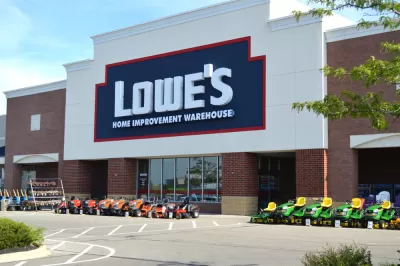The New York Times takes a deep dive into the "dark store theory" costing local municipalities millions, and potentially more, in property tax revenues all over the country.

Patricia Cohen reports for The New York Times:
With astonishing range and rapidity, big-box retailers and corporate giants are using an aggressive legal tactic to shrink their property tax bills, a strategy that is costing local governments and school districts around the country hundreds of millions of dollars in lost revenue.
According to Cohen, the stores appraise their properties based on "sale prices on the open market of vacant or formerly vacant shells in other places."
Retail stores make the case that these tax arrangements are necessary to make ends meet in a changing market. Municipalities say corporations aren't paying their fair share. "Either way, homeowners and small businesses will have to pay more or live with smaller budgets for police, schools, garbage pickup and road repair," writes Cohen.
This is the dark store theory first detailed in urbanism media by Laura Bliss in November 2018 and reported locally in March 2017 by Glenn Hegar for the Austin Statesman.
Evidence of dark store theory's domino effect on local municipalities is piling up. According to an October 2018 report by the Michigan Association of Counties, dark store theory reduced local revenues in the state by $100 million between 2013 and 2017. "In Texas, the comptroller said such appeals could end up costing local governments $2.6 billion a year," according to Cohen.
The article also includes specific examples, like the case of a Lowe's in Wauwatosa, Wisconsin, where "the company spent more than $16 million to buy the land and construct its 140,000-square-foot building less than a dozen years ago," according to Cohen. "The city assessed the spot in a bustling retail hub right off Highway 41 at $13.6 million. The company’s appraisal was $7.1 million, based on sales of empty and once empty buildings in other neighborhoods."
According to Cohen, legislation to curb the practice has been considered in Alabama, Texas, and Indiana.
For more coverage on dark store theory, see an article by Joyce Jauer, Olga Garza and Bruce Wright for the Texas Comptroller in February 2017, Abby Jackson for Business Insider in August 2017, Sehvilla Mann for NPR in November 2017, and Rebecca Badgett for the University of North Carolina School of Government in March 2018. An opinion piece from August 2017 by Judy S. Engel and Lynn S. Linné argues in favor of the practice.
FULL STORY: As Big Retailers Seek to Cut Their Tax Bills, Towns Bear the Brunt

Maui's Vacation Rental Debate Turns Ugly
Verbal attacks, misinformation campaigns and fistfights plague a high-stakes debate to convert thousands of vacation rentals into long-term housing.

Planetizen Federal Action Tracker
A weekly monitor of how Trump’s orders and actions are impacting planners and planning in America.

In Urban Planning, AI Prompting Could be the New Design Thinking
Creativity has long been key to great urban design. What if we see AI as our new creative partner?

Chicago’s Ghost Rails
Just beneath the surface of the modern city lie the remnants of its expansive early 20th-century streetcar system.

Baker Creek Pavilion: Blending Nature and Architecture in Knoxville
Knoxville’s urban wilderness planning initiative unveils the "Baker Creek Pavilion" to increase the city's access to green spaces.

Pedestrian Deaths Drop, Remain Twice as High as in 2009
Fatalities declined by 4 percent in 2024, but the U.S. is still nowhere close to ‘Vision Zero.’
Urban Design for Planners 1: Software Tools
This six-course series explores essential urban design concepts using open source software and equips planners with the tools they need to participate fully in the urban design process.
Planning for Universal Design
Learn the tools for implementing Universal Design in planning regulations.
planning NEXT
Appalachian Highlands Housing Partners
Mpact (founded as Rail~Volution)
City of Camden Redevelopment Agency
City of Astoria
City of Portland
City of Laramie





























